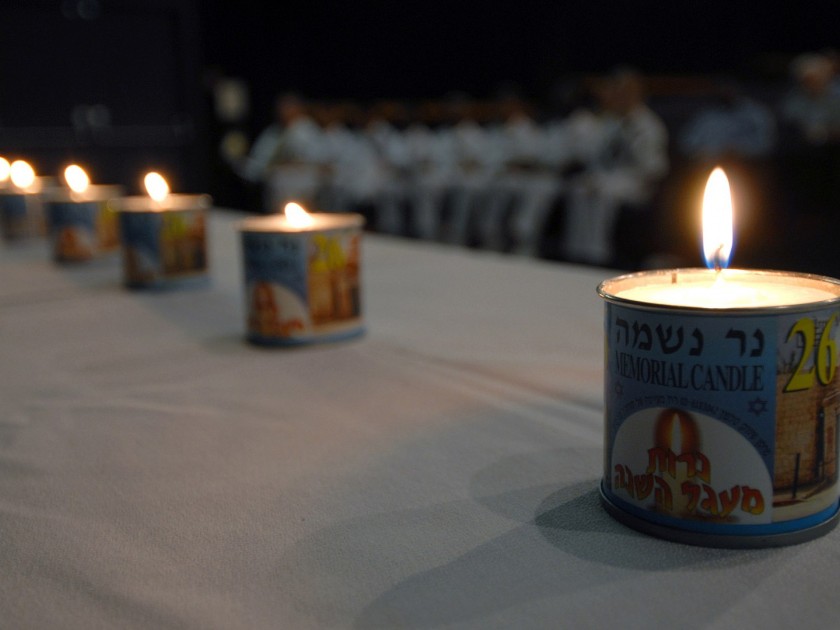Join a community of readers who are committed to Jewish stories
Sign up for JBC’s Nu Reads, a curated selection of Jewish books delivered straight to your door!

Photo by James E. Foehl
Soon I will be observing the fourth yahrzeit for my sweet mom, Millie. As the COVID-19 pandemic sweeps the globe, I find myself oddly feeling grateful nearly every day that my mother is not alive to be experiencing our current reality. The facility where she lived was among the first to have confirmed cases of the disease in my area, and the image of my mom sitting alone in her room wondering if she will be struck ill, is almost more than I can bear to contemplate.
I often think back to her yahrzeit last year, which fell during the time I was teaching a Jewish law course in Israel. I wanted to recite the mourner’s kaddish for her, as I do each year in keeping with my religious practice. One might think that finding a minyan in Israel would be like finding a good bagel in New York, but the reality did not match up to my expectation. I was staying in close proximity to the IDC Radzyner Law School, on the beautiful beach in Herzliya. Soon upon my arrival, I started making calls to ensure that there would be a minyan close by that I could attend on the morning of my mother’s yahrzeit.
But given the resort nature of this particular area, virtually all the minyanim were small and lacking a mechitza, the divider separating men and women that is essential for prayer with mixed genders according to Jewish law in Orthodox practice. Finally, I was able to connect by phone with a local rabbi who asked me if I was Reform. I instinctively switched to Hebrew as if to exhibit a higher level of authenticity, “No… I’m traditional.” He explained that there was one place in the area where I could go, and gave me directions for a Sephardic minyan.
I wanted to recite the mourner’s kaddish for her, as I do each year in keeping with my religious practice.
The next morning, I embarked on the fifteen-minute walk to the destination he described. I found the minyan but there was no mechitzah. What I found instead was an experience I will remember for the rest of my life. Although I thought I had arrived early, the service was already well underway. No one came over to me or handed me a prayer book. Even though I know the morning service well, the prayers seemed so different and I could not recognize where they were in the service.
I soon noticed a young woman sitting alone, outside the area where the service was being conducted. I sat next to her as there was no place else for me to be. I soon learned that she did not come there to pray.
The woman was dressed in traditional Sephardic clothing that covered her from head to toe despite the already warm sun on this Israeli morning. She did not speak English, so we conversed in Hebrew. I learned that she had been abused by her husband and was alone with seven young children. She had a letter of endorsement from a local rabbi, which she showed me. The letter was asking for money on her behalf and she was there to collect shekels from the men after they concluded their prayers.
There we sat — two strangers from completely different worlds whom life had brought together for a few moments. She told me her story and asked about my mom. We connected in a way that would have been virtually impossible in just about any other place and time. I gave her a contribution for which she expressed profound gratitude. She then asked for my mom’s name, Malkah bat Yehudah v’Yette Dina, and then offered a blessing in my mom’s name. At one point during our conversation, she said — “listen — they are saying kaddish.” I jumped to my feet and joined in the recitation of the prayer. A few minutes later, another kaddish was said by the men. And again, I joined while standing at my place.
There we sat — two strangers from completely different worlds whom life had brought together for a few moments.
After the service, the young woman stepped up to the area where the men had been praying and asked for their help. I sat and watched for a few minutes, and then departed. I had not envisioned this remixed yahrtzeit while in Israel, but I also felt my mom’s presence more viscerally than at any other time I had said kaddish for her. I imagined her smiling at me with approval.
This year I will be saying kaddish with a minyan on Zoom. Although my synagogue, like so many others, has adopted Zoom for daily and even Shabbat services, I haven’t been motivated to pray on Zoom. Praying on Zoom reminds me too much of my work life. But on this yahrtzeit, I will have no other choice. We are now in a world where remixed Judaism is often our only option. I will say kaddish on Zoom with others in my community as I reflect on the wonderful woman who gave me life.
Roberta Rosenthal Kwall is the Raymond P. Niro Professor at DePaul Law School. A prolific scholar whose work focuses on Jewish law and culture, Kwall lectures widely at synagogues, Jewish organizations, and law schools in America and Israel. Her popular writings on topics of relevance to the Jewish community have appeared in many of the most established Jewish media venues.